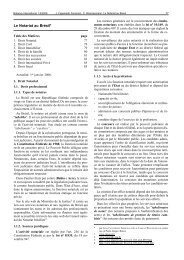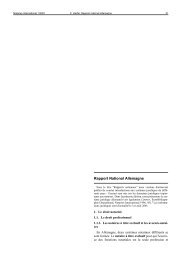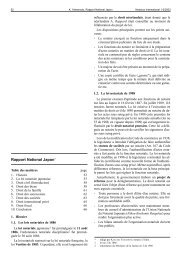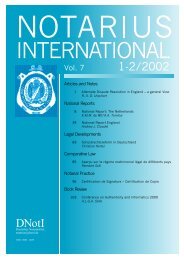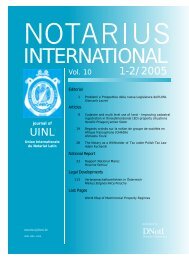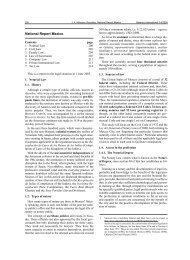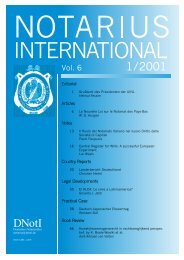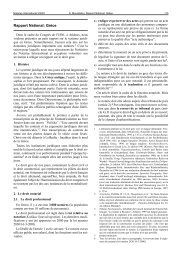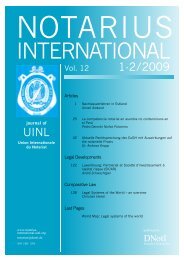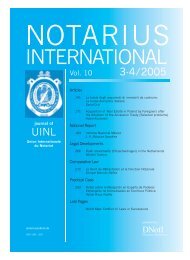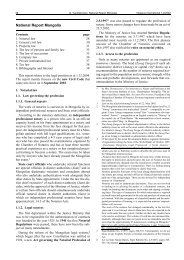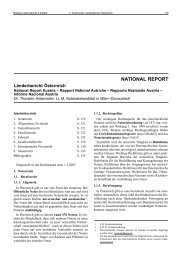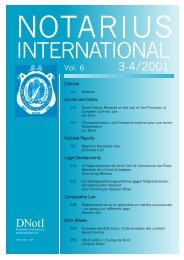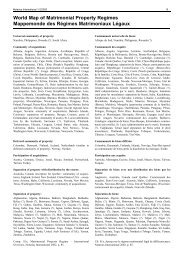ARTICLES and NOTES - Notarius International
ARTICLES and NOTES - Notarius International
ARTICLES and NOTES - Notarius International
You also want an ePaper? Increase the reach of your titles
YUMPU automatically turns print PDFs into web optimized ePapers that Google loves.
<strong>Notarius</strong> <strong>International</strong> 3-4/2002 T. Antenreiter, National Report Austria 141<br />
public who deal with numerous tasks as representative of<br />
the court (Court Commissioners). The deaths which occur<br />
within the territorial jurisdiction of a local court are<br />
allocated to the notaries in the place where the court is, in<br />
accordance with a system of allocation set out in advance<br />
for a whole year.<br />
Alongside dealing with practical matters of administration<br />
(in particular looking for heirs, investigating the financial<br />
circumstances, possible property inspections <strong>and</strong> safeguarding<br />
the estate etc) the competent Court Commissioner<br />
then invites the heirs, relatives or other persons who<br />
were close to the deceased to the drawing up the record of<br />
the death (Todfallaufnahme), which serves as the basis for<br />
the probate proceedings. The notary further undertakes the<br />
official announcement of any testamentary instructions<br />
<strong>and</strong> draws up, if stipulated, the inventory of the estate after<br />
prior valuation of the estate by court-sworn experts.<br />
In practice most court orders are largely prepared by<br />
the notaries. The court is thus in the position to accept the<br />
notary’s proposals after detailed checking of the content.<br />
The probate proceedings are completed by the final order<br />
of the court <strong>and</strong> the issue of the (non-appealable) final<br />
transfer certificate (rechtskräftige Einantwortungsurkunde)<br />
75 .<br />
The Einantwortungsurkunde is basically a court certificate<br />
stating who are the heirs <strong>and</strong> which is their respective<br />
quota of the estate, whether they have accepted<br />
the inheritance with unlimited or limited liability <strong>and</strong><br />
whether there is a fideicommissary substitution or a similar<br />
encumberment of the heirs’ position. When the<br />
cour’s certificate has become final <strong>and</strong> non-appealable,<br />
the heirs become universal successors in title of the deceased<br />
(including the real estate even though they have<br />
not yet been registered in the l<strong>and</strong> register). At the same<br />
time, they are liable for the deceased’s debts; their liability<br />
is limited to the amount of the estate, if the heirs have<br />
declared so in their declaration of acceptance of the inheritance<br />
(bedingte Erbserklärung).<br />
6. Company law<br />
The term “trader” (Kaufmann): in the Austrian Commercial<br />
Code (H<strong>and</strong>elgesetzbuch: HGB) the term “Unternehmen”<br />
(business/business undertaking) does not appear;<br />
the terms “trader” <strong>and</strong> “company” (Firma) are<br />
most frequently used. The designation “Kaufmann” is,<br />
however, not a st<strong>and</strong>ard legal term. It is used in the first<br />
place to distinguish on the basis of the size of the business<br />
undertaking between a small trader (Minderkaufmann),<br />
whose business does not require to be organised<br />
commercially, <strong>and</strong> a merchant, who has been registered<br />
as such in the Companies Register. Secondly, a “kaufmännisches<br />
Unternehmen” (business undertaking) comes<br />
into existence either on the basis of registration in the<br />
Companies Register or on the basis of the commercial activity<br />
which the undertaking pursues 76 .<br />
Company (Firma): the term “company” under Austrian<br />
law means the name under which the business undertaking<br />
appears in public <strong>and</strong> in its legal relations, <strong>and</strong> under<br />
which, as a rule, it is registered in the Companies<br />
Register 77 .<br />
Companies Register (Firmenbuch): the majority of<br />
Austrian businesses are registered in the “Companies<br />
Register of the Republic of Austria”. This is a public register<br />
operated electronically by the Commercial Court,<br />
which anyone may look at <strong>and</strong> find out key information<br />
relating to a specific business, in particular about the<br />
company, the participating members (depending on the<br />
type of company), the amount of share capital, the registered<br />
office of the business <strong>and</strong> the persons authorised to<br />
represent the business <strong>and</strong> the nature of their power of<br />
representation 78 .<br />
A company search may be carried out at any time on<br />
the Internet on payment of a fee. All notaries are statutorily<br />
obliged to provide the technical requirements in their<br />
offices to enable anyone to look at the Companies Register,<br />
<strong>and</strong> for this reason in practice there is comprehensive<br />
availability of this service through Austrian notaries 79 .<br />
6.1. Sole traders<br />
In its simplest form of a sole trader (Einzelunternehmen)<br />
a business is operated by an individual who brings<br />
chiefly his personal capacity for work <strong>and</strong> productivity<br />
into the business. This individual represents the business<br />
in its external relations <strong>and</strong> is the holder of the rights <strong>and</strong><br />
duties affecting the business. In particular this person has<br />
unlimited liability to the full extent of his assets.<br />
A sole trader business attains merchant status when it<br />
operates a commercial enterprise of a certain size (commercial<br />
enterprise by virtue of the objects of a business) or<br />
is entered in the Companies Register (commercial enterprise<br />
by virtue of Companies Register entry). As a rule the<br />
company contains the personal name of the sole trader 80 .<br />
The setting up of a sole trader business is extremely<br />
simple <strong>and</strong> requires no particular legal form; accordingly<br />
there is no m<strong>and</strong>atory notarial involvement. The<br />
main statutory authority is the currently valid version of<br />
the Austrian Commercial Code.<br />
6.2. Civil law partnerships <strong>and</strong> personal companies<br />
6.2.1. Civil law partnership<br />
A civil law partnership (Gesellschaft des Bürgerlichen<br />
Rechts: GesBR) is formed by means of an agreement between<br />
at least two partners in order to pursue jointly a<br />
particular business objective, in particular a self-employed<br />
or small trader activity. Consequently a civil law<br />
partnership cannot be entered in the Companies Register.<br />
The civil law partnership does not have legal personality<br />
<strong>and</strong> is not capable of being a party in a lawsuit. In its<br />
legal relations it is thus the individual partners who act<br />
exclusively <strong>and</strong> who appear as jointly entitled parties or<br />
jointly obligated parties. It is possible for the civil law<br />
partnership to have a business designation but not to operate<br />
a company.<br />
75 Art. 819 ABGB (General Civil Code)<br />
76 Arts 1 to 7 Commercial COde<br />
77 Arts. 17ff. ABGB (General Civil Code)<br />
78 Art. 8 ABGB (General Civil Code); Companies Register Law 1991<br />
(Firmenbuchgesetz: FBG)<br />
79 Art. 35 Companies Register Law<br />
80 Arts. 17 <strong>and</strong> 18 ABGB (General Civil Code)



